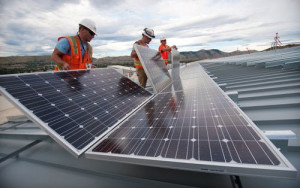2021 IECC: Flexibility for the Future | 2021 IECC: Commercial | 2021 IECC: Residential
 Renewable energy and battery storage are assuming a larger and larger place in both the current building market and goals for the sustainability of buildings in the future. Likewise, resiliency is becoming an increasingly important consideration in how buildings are constructed. The IECC has an important role to play in these topics.
Renewable energy and battery storage are assuming a larger and larger place in both the current building market and goals for the sustainability of buildings in the future. Likewise, resiliency is becoming an increasingly important consideration in how buildings are constructed. The IECC has an important role to play in these topics.
The following proposals augment the code to ensure that buildings are ready for a future of greater resiliency and renewables. They update existing requirements and definitions to align them with current market and policy trends and introduce new requirements to ensure that buildings built today can adapt to resiliency and zero energy goals in the future. Official public comments which suggest changes to the proposal are also included below.
Commercial
CE31-19 Part 1: Renewable Energy Definition (1). Approved as Submitted by Code Development Committee. This proposal updates the definitions related to renewable energy and renewable energy systems to provide greater clarity and to align them with current understanding of the shape and character of renewable energy sources in the market. Proponent for this proposal is Jim Edelson, representing New Buildings Institute.
CE21-19: Renewable Energy Definition (2). As Modified by Public Comment 1. This proposal updates the definitions of biomass-related renewable energy for greater clarity and specificity in order to ensure that biomass-based sources of energy can reasonably be considered renewable energy. Proponent for this proposal is Jim Edelson, representing New Buildings Institute.
CE262-19: Storage Ready. Approved as Submitted by Code Development Committee. Appendix CA provides a mechanism for jurisdictions to require buildings to be built with the infrastructure required for on-site renewable energy systems and a future of zero net energy. This proposal modifies Appendix CA provisions to ensure that there is design and space consideration for a standard sized battery rack, and for the connections to the electrical panels. Proponent for this proposal is Jim Edelson, representing New Buildings Institute.
Residential
CE217-19 Part 2: Residential Renewable Definition. Approved as Submitted by Code Development Committee. The residential section references renewable energy but does not include a definition for renewable energy. This proposal introduces a definition for renewable energy that is consistent with the definition from the commercial section. Proponent for this proposal is Jim Edelson, representing New Buildings Institute.
RE204-19: Residential Renewable Energy Credits. Approved as Submitted by Code Development Committee This proposal impacts who may claim the environmental attributes of an onsite-renewable energy system. The environmental attributes of solar power, or other renewable energy, have market value that is reflected and transacted in Renewable Energy Credits (REC). It adds a definition for RECs and a requirement that those environmental benefits remain with the building if the energy is to be considered “renewable” for the purposes of the code. Proponent for this proposal is Jim Edelson, representing New Buildings Institute.
RE223-19: Appendix RB Zero Energy Residential Appendix. Approved as Modified by Public Comment 2. This proposal creates an appendix that would provide cities and states a standard to define a zero energy home using the ERI compliance approach. Proponent for this proposal is Eric Makela, representing New Buildings Institute; Lauren Urbanek, representing Natural Resources Defense Council.
Contact Amy Cortese, NBI director of programs, at [email protected], with any questions.
Additional 2021 IECC Proposals
Flexibility for the Future Commercial Residential
